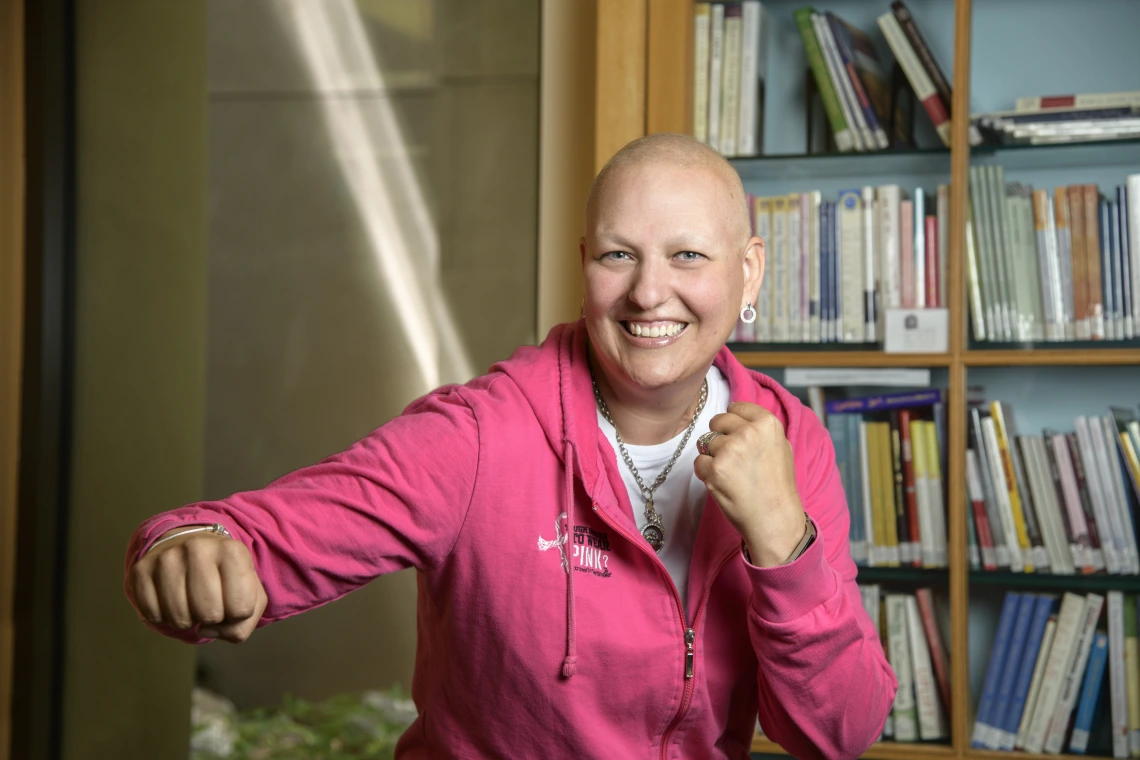Patient Profile: Kristie Kilkelly

For Kristie Kilkelly, knowledge is power. She provides her high school history students with the tools needed to gather knowledge for themselves. She places a high premium on scientific knowledge. And she understands from firsthand experience that self-knowledge can be lifesaving.
“Know your body,” Kristie says. “I found my breast cancer because I knew my body.”
It was just before Christmas 2009, and Kristie was only 29 years old. After her biopsy, she flew from her home in Yuma to spend the holidays with her family in Ohio. But she didn’t want to wait for her biopsy results. She told her doctor, “When you have the results, call me — I don’t care what day it is.”
That day turned out to be Christmas Eve, and the call came when she was surrounded by family.
“I will never forget that phone call,” Kristie says about the day she learned she had an aggressive type of cancer called triple-negative breast cancer. “On Christmas Day we did our thing, and the following day I jumped on the computer.”
Kristie’s Internet search introduced her to Robert Livingston, MD, a University of Arizona Cancer Center oncologist specializing in breast cancer.
“Dr. Livingston literally wrote the book on breast cancer research,” she says. “He was the pioneer in the field. What better place for me to be?”
She had a double mastectomy, radiation and reconstructive surgery. Not only did she make it through her treatments like a champ, she also found the time for romance.
“James met me at my worst,” Kristie says with a laugh. They were married in 2012 and had two sons, now 4 and 6. Then, in September 2016, she had a grand mal seizure. That’s when she learned the cancer had come back — even after the double mastectomy.
“Let’s face it, unless you take a microscope to every little cell, you’re not going to know if you got all of it,” she says. “Apparently we forgot one cell somewhere!”
‘The more we know, the more we can offer’
That little cell had metastasized, spreading into her brain and her lungs.
“I had a total of seven tumors,” Kristie says. “The largest one was the size of my hand.”
The re-emergence of her cancer coincided with the passing of Dr. Livingston, whose death came as a shock to the UA Cancer Center community. Many of his patients, including Kristie, started seeing Pavani Chalasani, MD, MPH, leader of the UA Cancer Center’s breast cancer clinical research team.
Dr. Chalasani recommended a clinical trial with a drug similar to another chemotherapy that treats colorectal cancer. Participants needed to fit a very specific profile, and Kristie’s case was a perfect match.
“I felt it was almost a duty that God had put at my feet,” she recalls. “They’re getting valuable information from me that could change how we treat triple-negative breast cancer forever.”
Every three weeks since February 2017, Kristie has made the trek from Yuma to Tucson to receive infusions of the study treatment.
“We started out with seven tumors. We’re down to one tumor, in my lung, that is active but shrinking,” she says.
Although Kristie encourages all patients to weigh risks and benefits for themselves, her experience as a clinical trial participant has been a positive one.
“Know what you’re getting into, but also know that it will lead to so much good on the other side,” she says. “We can only offer what we know about, and the more we know, the more we can offer.”
‘A happy place’
At work, Kristie wrangles high school sophomores and advises a political debate club. On the first day of every school year, she tells her students about her diagnosis and throughout the year is available to talk with any student whose family is impacted by cancer.
Her refusal to give power to the stigma surrounding the disease has touched many of her students’ lives.
“Quite a few of them have gone into oncology care,” Kristie reports. “Until they had me as a teacher, they didn’t even think it could be a happy place.”
Outside the classroom, she wears her educator hat everywhere she goes. She enjoys talking to medical students and interns, and educates lab techs, guiding them to find her port, an artificial vein used to deliver cancer drugs to the bloodstream. “I could access it myself if they would let me,” she says, laughing.
Through the Yuma Silver Spur Rodeo, Kristie has chaired the Tough Enough to Wear Pink campaign every February for six years, spreading awareness and honoring those who have battled the disease.
“It’s a sea of pink all over the rodeo grounds. Even the cowboys wear pink,” she says. “It’s amazing to see a community come together.”
Kristie takes great pride in her role as an ambassador for breast cancer awareness and an example of survivorship. She dislikes pity, and bristles when well-meaning acquaintances overload her with sympathy.
“I don’t want that reaction,” she says. “They were already giving me condolences. I’m not dead! I’m alive and I’ve been kicking cancer’s butt!”
Along with treatments, she credits her remarkable progress to her fighting spirit, and hopes to inspire others with her story.
“This is happening to me, but it doesn’t define me,” Kristie says. “I am not the cancer. I am living with cancer. I am living proof that it’s not a death sentence.”



